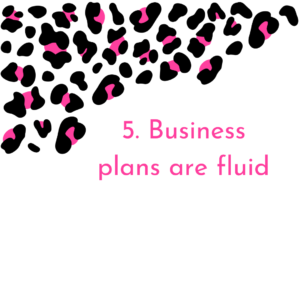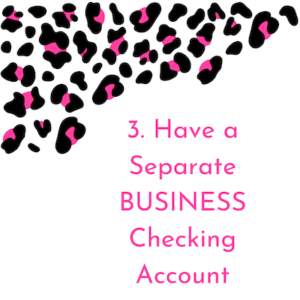As I reflect on the trajectory of my career as a professional voice over actor, I am blessed with how my cookie has crumbled. A combination of hard work, coaching, and making the right adjustments along the way has served me well. I however, am lucky, as I came into voiceover later in life. When I started in voice over as a second career, I was highly educated with an advanced degree. I’m also surrounded by professionals in my family. I happen to come from a family of attorneys and get more advice than you could ever think possible. That said, in talking to some newer voice talents recently, there are a few things that I wish I had known about the business side of things when I get started in voice over. Here is a countdown of my top 5:
 5. Business Plans are Fluid
5. Business Plans are Fluid
When I got started in voice over, I spent months developing a business plan. Little did I know that as my goals shifted, my business plan would shift. While my initial plan worked when I only had a few demos under my belt, as I began to target more genres and add multiple revenue streams, my business plan needed to evolve to address my growing and widening ambitions. While I am so proud of how I launched, I then had to learn to tweak and adjust to go after new goals as well. This ranged from social media to direct marketing to presence on pay to play sites. All of this was part of my business plan and as my target audience evolved so did my plan.
4. The CRM Matters A LOT!!
 So different voice actors in the industry use different CRMs. As a voice over coach, I can tell you that it matters less which one that you use and more that you use one!! I myself started with nimble and switched to Voiceoverview. I love Voiceoverview and have interviewed creator and owner Dani States and blogged about that. For me, this CRM meets all my needs. Whether you use Voiceoverview, Upper Level, 17 Hats, or one of the many others, you need to be aware of several data points:
So different voice actors in the industry use different CRMs. As a voice over coach, I can tell you that it matters less which one that you use and more that you use one!! I myself started with nimble and switched to Voiceoverview. I love Voiceoverview and have interviewed creator and owner Dani States and blogged about that. For me, this CRM meets all my needs. Whether you use Voiceoverview, Upper Level, 17 Hats, or one of the many others, you need to be aware of several data points:
- who you’re reaching out to, how often, and if they are replying
- your income
- your expenses
- your audition to booking ration
If you are lucky, you can create reports that go beyond this. like how much of your work comes from repeat clients or from agents, are you booking from one pay to play more than another, where do the bulk of your expenses lie. These reports give you invaluable insight into future choices that you might make. Initially when I started in voice over I simply made excel spread sheets. I can tell you after years in the industry that the data that you get from a CRM is essential to running your small business.
3. Have a Separate BUSINESS Checking Account
 As a soloprenuer, you need a business checking account. Even if you are not an LLC, you might be able to get away with depositing work checks or transferring money into your personal checking account for a little while.It is, however, better for you to actually have a proper business checking account. I’ll share a little story. When I started out in voice over I was luck to be added to multiple rosters pretty early on. One of those rosters sent me work weekly and paid me monthly. One day I went to the local branch with the check as this was before the days of mobile deposits. I had been depositing monthly checks from this client for almost two years in what I thought was a “business” checking account. It was a separate account that I had opened for my business at my local Chase. Somehow, Chase had just opened another checking account, but it was never designated a “business” account. Instead, it was just a second “personal” checking account. So that this does not happen to you, if they do not ask for you business’ legal formation papers, it is likely not a business account. That day, the bank refused to deposit the check. Instead, I had to gather all the documents I had for my business which happens to be an LLC and at that point, several years in, I opened both a business checking and a business savings account.
As a soloprenuer, you need a business checking account. Even if you are not an LLC, you might be able to get away with depositing work checks or transferring money into your personal checking account for a little while.It is, however, better for you to actually have a proper business checking account. I’ll share a little story. When I started out in voice over I was luck to be added to multiple rosters pretty early on. One of those rosters sent me work weekly and paid me monthly. One day I went to the local branch with the check as this was before the days of mobile deposits. I had been depositing monthly checks from this client for almost two years in what I thought was a “business” checking account. It was a separate account that I had opened for my business at my local Chase. Somehow, Chase had just opened another checking account, but it was never designated a “business” account. Instead, it was just a second “personal” checking account. So that this does not happen to you, if they do not ask for you business’ legal formation papers, it is likely not a business account. That day, the bank refused to deposit the check. Instead, I had to gather all the documents I had for my business which happens to be an LLC and at that point, several years in, I opened both a business checking and a business savings account.
Now, you might be thinking, why does she have a business savings account to? Well, as a business owner we have to take out and set aside our own taxes. I pay quarterly taxes. Every single time I get pad, I set aside 40% into that savings account. So, I encourage you to have BOTH a business checking and a business savings account.
2. Save for Retirement- Especially if you are Non-Union
 I wish someone had told me when I started, as I did not think of this until several years into my career. Think about all the bills you pay. Some day, when you stop working, don’t you want to have something for yourself? Every single month I auto deposit a nice amount into my 401k, and I am proud to say that I am setting aside as much as my husband does every month. Now, if you are a union talent, you will retire with savings. For those of us who are non-Union, all you have to do is set one up and then go to your bank where you have your work checking account and auto fund it. I have my 401k at Charles Schwab because I was advised that their fees are low.
I wish someone had told me when I started, as I did not think of this until several years into my career. Think about all the bills you pay. Some day, when you stop working, don’t you want to have something for yourself? Every single month I auto deposit a nice amount into my 401k, and I am proud to say that I am setting aside as much as my husband does every month. Now, if you are a union talent, you will retire with savings. For those of us who are non-Union, all you have to do is set one up and then go to your bank where you have your work checking account and auto fund it. I have my 401k at Charles Schwab because I was advised that their fees are low.
- Rome Wasn’t Built in a Day
 When I started my business I spent a lot of money very quickly. I invested a lot and planned to be a huge success. While I was fortunate and success did come, expenses mount quickly. I know see ways that I could have spent less and spread out my investments over time so that as my business grew I re-invested in myself. Be mindful of your money. There are no guarantees in this industry. As you make choices, try to spend money in places that will likely generate business.
When I started my business I spent a lot of money very quickly. I invested a lot and planned to be a huge success. While I was fortunate and success did come, expenses mount quickly. I know see ways that I could have spent less and spread out my investments over time so that as my business grew I re-invested in myself. Be mindful of your money. There are no guarantees in this industry. As you make choices, try to spend money in places that will likely generate business.


